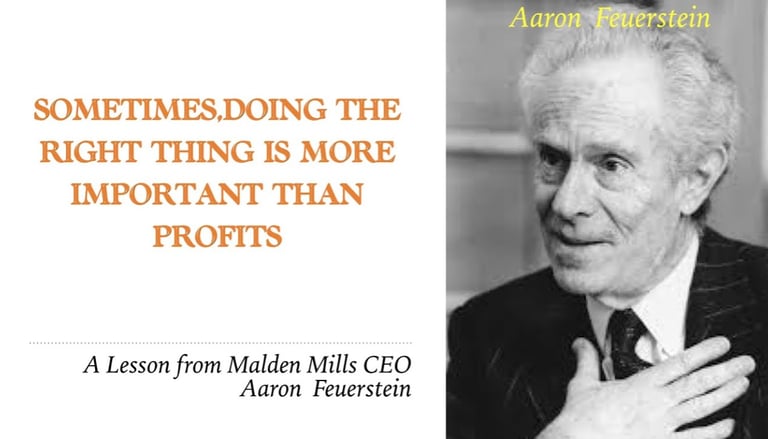"The Malden Mills Case: A Lesson in Ethical Leadership and Compassionate Management"
The Malden Mills case is a popular one embarking on the involvement of good work ethic, humanity and the basic rights of people helping people through the bad times. “The ethics dilemma derives from the perceived conflict between the traditional corporate objective of profit maximization and the overall desire for increased social welfare.
Arjun Vinod
5/15/20245 min read


The Malden Mills Case: A Lesson in Good Work Ethic and Humanity
The Malden Mills case is a well-known example that highlights the importance of good work ethic, humanity, and the basic rights of people helping each other through tough times. It brings to light an ethics dilemma that stems from the perceived conflict between the traditional corporate objective of profit maximization and the overall desire for increased social welfare.
The Story of Malden Mills
Malden Mills, a textile manufacturer based in Massachusetts, faced a devastating fire in 1995 that destroyed a significant portion of its manufacturing facility. The fire not only threatened the livelihood of the company and its employees but also sent shockwaves through the local community.
Instead of succumbing to the pressure and taking the easy way out by laying off its workforce and relocating the business, Malden Mills' CEO, Aaron Feuerstein, made a remarkable decision that set a precedent for ethical leadership and compassion in the face of adversity.
Aaron Feuerstein's Ethical Stand
Aaron Feuerstein, often hailed as a champion of ethical business practices, chose to uphold the basic rights of his employees despite the immense challenges posed by the fire. Not only did he continue to pay the salaries of all the affected workers, but he also retained their health benefits during the period of reconstruction.
Feuerstein's decision to prioritize the well-being of his employees over short-term financial gains showcased a rare display of empathy and a deep sense of responsibility towards the community. His actions reflected a commitment to upholding human dignity and the belief that business success should not come at the expense of people's livelihoods.
By choosing to rebuild the company on the same site where the fire had occurred, Feuerstein also demonstrated his dedication to the local community and his belief in the resilience of the workforce. His unwavering commitment to his employees and the town of Lawrence sent a powerful message about the values of loyalty, compassion, and integrity in business.
Feuerstein's approach to handling the crisis at Malden Mills not only garnered widespread admiration but also sparked important conversations about the role of businesses in society and the ethical responsibilities that come with corporate leadership.
The Ethics Dilemma
The Malden Mills case brings to the forefront an ethics dilemma that continues to be relevant in today's corporate landscape. It underscores the tension between the traditional pursuit of profit maximization and the broader goal of promoting social welfare and ethical conduct.
Businesses often grapple with the challenge of balancing financial objectives with the moral imperative to consider the well-being of their employees, customers, and the communities in which they operate. The case of Malden Mills serves as a poignant reminder that ethical decision-making is not just a theoretical concept but a practical necessity with real-world implications.
While maximizing profits is a fundamental goal for businesses, the manner in which these profits are generated and the impact they have on various stakeholders cannot be overlooked. The actions of Aaron Feuerstein exemplify the idea that ethical leadership and compassionate management can coexist with long-term business success.
Furthermore, the Malden Mills case highlights the importance of reevaluating traditional business paradigms and embracing a more holistic approach to corporate governance. It underscores the need for businesses to consider the broader social and ethical implications of their decisions, even in the face of adversity and financial challenges.
Ultimately, the Malden Mills case serves as a compelling narrative that challenges conventional notions of corporate responsibility and underscores the transformative power of ethical leadership in shaping a more humane and sustainable business environment.
The Ethical Dilemma: Profit Maximization vs. Social Welfare
The Malden Mills case exemplifies the ethical dilemma that often arises in the corporate world, where the traditional objective of profit maximization can come into conflict with the broader societal goal of promoting social welfare. This tension highlights the need for a more nuanced and balanced approach to business decision-making that takes into account the long-term consequences of corporate actions on employees, communities, and the environment.
In the aftermath of the Malden Mills fire, Feuerstein's decision to prioritize his employees' well-being over short-term financial gains was widely praised, but it also raised important questions about the role of businesses in supporting their local communities and the extent to which they should be held accountable for the social impact of their decisions.
The Changing Landscape of Corporate Social Responsibility
Over the past few decades, the concept of corporate social responsibility (CSR) has gained increasing prominence, with more and more companies recognizing the importance of addressing societal issues and aligning their business practices with the broader needs of the communities in which they operate.
This shift has been driven by a growing awareness of the interconnectedness between business success and social well-being, as well as the recognition that sustainable long-term growth requires a more holistic approach to value creation that considers the interests of all stakeholders, including employees, customers, suppliers, and the local community.
The Malden Mills case serves as a powerful example of how companies can choose to embrace a more socially responsible approach to business, even in the face of significant financial challenges. Feuerstein's actions demonstrated that prioritizing the well-being of employees and the local community can, in the long run, contribute to the overall success and resilience of the business.
The Role of Leadership in Shaping Ethical Business Practices
The Malden Mills case also highlights the crucial role that corporate leadership plays in shaping ethical business practices and fostering a culture of social responsibility within an organization.
Feuerstein's decision-making during the crisis was driven by a deep commitment to his employees and the local community, as well as a strong sense of ethical obligation. His actions reflected a leadership style that prioritized empathy, compassion, and a long-term view of value creation, rather than a sole focus on short-term financial gains.
By setting an example of ethical leadership, Feuerstein inspired and motivated his employees, fostering a sense of loyalty and trust that ultimately contributed to the company's resilience and ability to overcome the challenges posed by the fire.
The Malden Mills case serves as a powerful reminder that ethical leadership is not only a moral imperative but also a strategic advantage in today's business landscape, where consumers, employees, and investors are increasingly seeking out companies that demonstrate a strong commitment to social responsibility and sustainable value creation.
Lessons Learned and Implications for the Future
The Malden Mills case offers valuable lessons for businesses and leaders seeking to navigate the complex ethical landscape of the modern corporate world. Some of the key takeaways include:
The importance of balancing profit maximization with a commitment to social welfare and employee well-being.
The need for corporate leaders to embrace a more holistic, stakeholder-centric approach to decision-making that considers the long-term impact of their actions on the broader community.
The strategic value of fostering a culture of ethical leadership and social responsibility, which can contribute to employee engagement, brand reputation, and long-term business resilience.
The recognition that corporate social responsibility is not just a moral imperative but also a competitive advantage in a business landscape that increasingly values sustainable value creation.
As the global business environment continues to evolve, the Malden Mills case serves as a powerful reminder that the most successful and enduring companies will be those that are able to strike a balance between profitability and social responsibility, guided by a strong ethical foundation and a genuine commitment to supporting the communities in which they operate.


